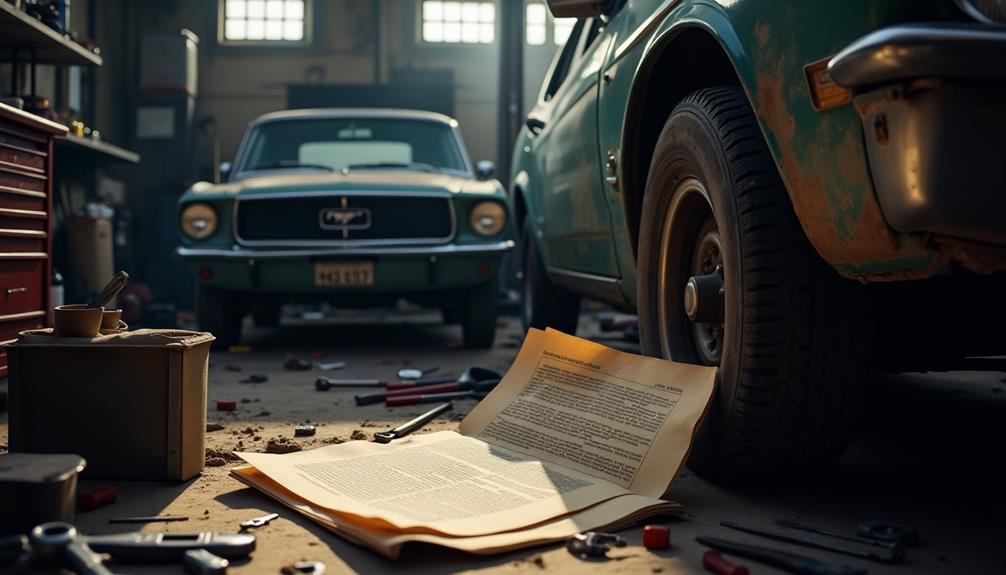You've likely fallen into the trap of hidden exclusions in aftermarket warranties, and it's a loophole mechanics often rely on. Many policies don't cover wear-and-tear items like brakes and batteries, leaving you responsible for unexpected costs. With about 50% of claims denied due to vague language and strict documentation requirements, it's easy to be caught off guard. Mechanics know that the lengthy claim processes can hinder timely repairs, creating frustration for everyone involved. If you're ready to uncover more about the pitfalls that could impact your wallet, there's plenty more to explore on this topic.
Key Takeaways
- Many aftermarket warranties exclude wear-and-tear items, leading to unexpected repair costs that mechanics may not disclose.
- Vague contract language allows warranty companies to deny claims, often leaving customers in the dark about coverage limits.
- Mechanics may be aware of common exclusions, yet they might not fully inform customers about potential denial reasons.
- Extensive documentation requirements can slow down repairs and create frustration for both mechanics and customers, complicating the warranty process.
- Understanding the fine print of your warranty can reveal hidden loopholes that could save you money on repairs.
Understanding Aftermarket Warranties
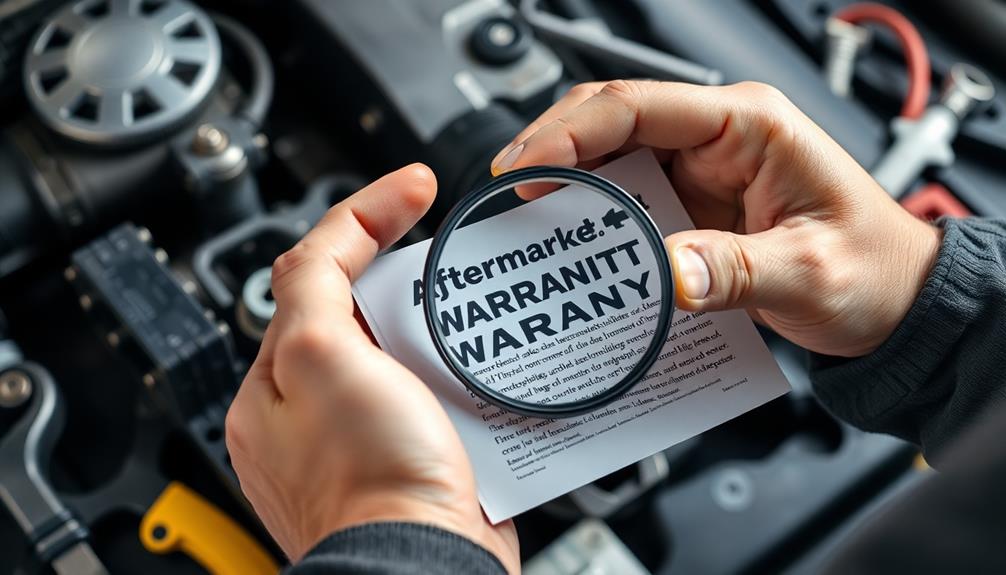
When you consider aftermarket warranties, it's crucial to understand their complexities. Many people assume these warranties provide extensive coverage, but that's often far from the truth. In fact, about 50% of claims get denied, typically due to hidden exclusions or specific limits in coverage. This can lead to significant frustration when you're counting on your warranty during a breakdown.
Moreover, the claim approval process can stretch up to 30 days, leaving you without your vehicle longer than you'd like. During this time, you might incur additional costs, especially since many policies don't cover diagnostic procedures. This means you could pay out-of-pocket for these assessments before repairs even start.
Communication with warranty companies can also be a hassle. You might face long wait times and multiple contacts just to resolve simple issues.
Plus, you may find disputes over labor rates and parts pricing complicate matters even further. It's easy to misinterpret the extent of coverage, leading to disappointment when you encounter denied claims or lower payouts than expected. Understanding these intricacies can help you navigate the world of aftermarket warranties more effectively.
Hidden Exclusions in Policies
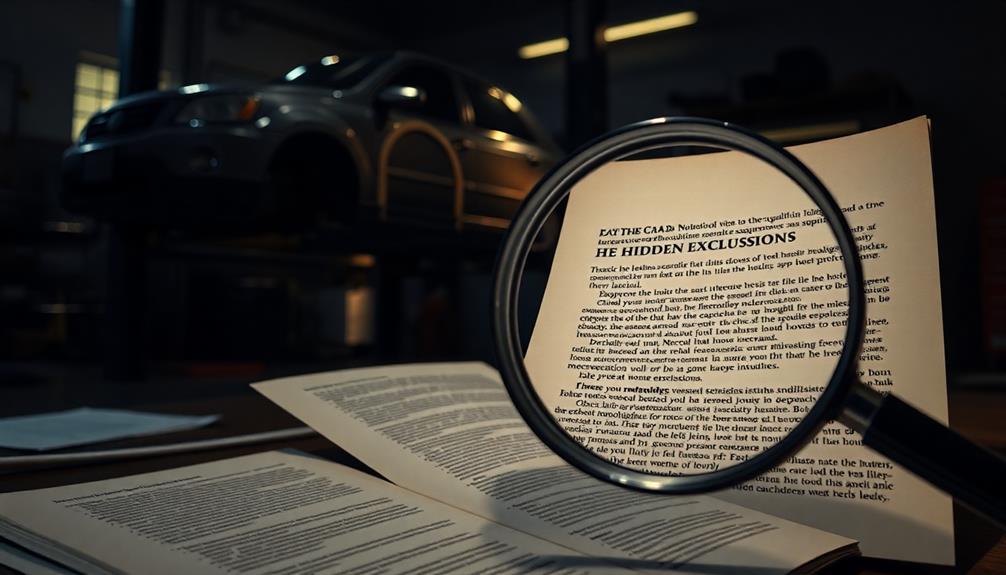
When you consider aftermarket warranties, be aware that hidden exclusions could limit your coverage considerably.
Common examples include wear-and-tear items and restrictions based on your vehicle's age or mileage, which can lead to unexpected claim denials.
It's crucial to read the fine print carefully to guarantee you understand what you're really agreeing to.
Policy Coverage Limitations
Hidden exclusions in aftermarket warranty policies frequently catch customers off guard, leading to unexpected expenses. In fact, about 50% of warranty claims get denied due to coverage limitations.
To avoid getting stuck with hefty bills, you should be aware of these potential pitfalls:
- Specific Parts: Certain parts may not be covered, leaving you unprotected during essential repairs.
- Wear and Tear: Repairs related to normal wear and tear are often excluded, which can surprise you when routine maintenance is needed.
- Complex Language: Warranty documents can use complicated terms that obscure important details about hidden exclusions.
- Negotiation Issues: The lack of transparency can create conflicts between auto repair shops and warranty companies, complicating claim approvals.
Before you purchase an aftermarket warranty, take the time to thoroughly review the terms.
Understanding these coverage limitations can save you from frustration and financial strain down the line.
Don't let hidden exclusions undermine your warranty claims; knowledge is your best defense.
Common Exclusion Examples
Exclusions in aftermarket warranty policies can leave you vulnerable to unexpected repair costs. Many customers assume that fundamental components like transmissions, engines, and electrical systems are covered, but hidden exclusions often tell a different story. In fact, around 50% of warranty claims are denied because of these hidden exclusions, leaving you frustrated and facing unplanned expenses.
Specific wear-and-tear items, such as brake pads, tires, and batteries, are typically excluded from coverage, even though they're essential for maintaining your vehicle. When you file a claim, you might find that the vague language in your warranty contract allows companies to deny claims based on their interpretation, which can catch you off guard.
Additionally, some warranties exclude repairs for pre-existing conditions. This means if any issue existed before you purchased the warranty—regardless of whether it was disclosed—you won't receive coverage.
Always read through the exclusions carefully; being informed can save you from costly surprises later on. Understanding these common exclusion examples helps you navigate warranty claims and guarantees you're not left paying out-of-pocket for repairs that you thought were covered.
Understanding Fine Print
Many consumers overlook the fine print in aftermarket warranty policies, which often contains essential details that can greatly impact coverage.
For example, many employers conduct background checks to verify candidate information, and similarly, understanding the specifics of warranty agreements can help you identify potential pitfalls. Hidden exclusions can lead to shockingly high out-of-pocket expenses when you least expect it.
Here are some significant areas to watch for:
- Age and Mileage Limits: Many warranties exclude coverage based on how old your vehicle is or how many miles it has.
- Specific Conditions: Repairs might be excluded if your vehicle hasn't been maintained according to the manufacturer's guidelines.
- Component Coverage Limits: Some policies specify caps on what they'll pay for certain parts, which can leave you footing the bill for the remainder.
- Claims Denials: Approximately 50% of warranty claims are denied, often due to these hidden exclusions.
Understanding the fine print is vital. If you find yourself relying on your warranty, knowing these hidden exclusions can prevent the frustration of denied warranty claims.
Warranty companies often prioritize profit over customer satisfaction, complicating the claims process even further. Don't let the fine print catch you off guard—always read it thoroughly before making a decision.
The Claim Process Explained
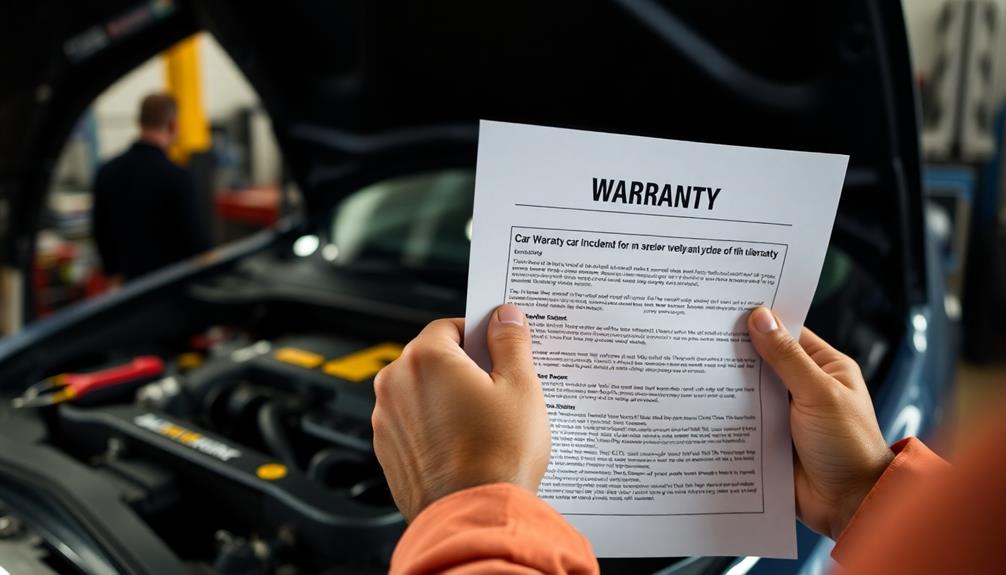
Steering through the claim process for aftermarket warranties can feel intimidating, especially when it resembles the complexities of insurance claims.
To start, you'll need to gather extensive documentation, including receipts and repair orders, to submit with your claim. Expect to spend some time on diagnostics; these procedures can take several hours, and unfortunately, warranty policies usually don't cover these costs.
Once you've filed your claim, you may face an average wait time of up to 30 days for claims approval, which can feel like an eternity. During this period, communication with warranty agents might lead to long wait times and disputes over labor rates and parts pricing, often impacting the outcome of your claim.
It's essential to be aware of hidden exclusions in your warranty policy, as approximately 50% of claims are denied, leading to unexpected expenses.
These exclusions can catch you off guard, especially if you assumed certain repairs were covered. By understanding the claim process and preparing adequately, you can navigate these challenges more effectively and minimize surprises down the road.
Common Denial Reasons
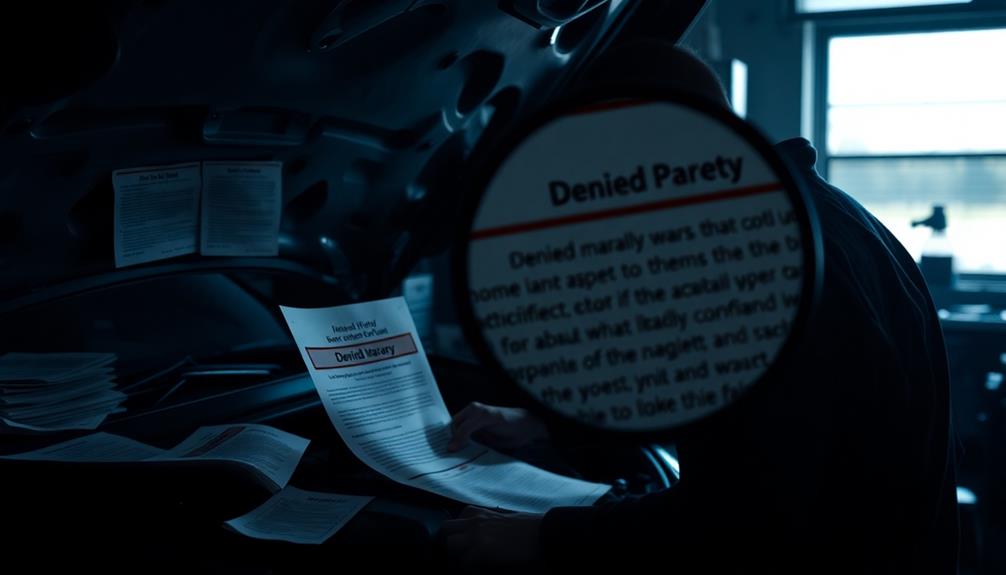
When you file a warranty claim, you might be surprised to find that certain repairs and parts aren't covered at all.
Incomplete documentation can also lead to quick denials, leaving you frustrated and out of pocket.
Understanding these common reasons can help you navigate the warranty process more effectively.
Excluded Repairs and Parts
You might be shocked to learn that a significant number of aftermarket warranty claims get denied due to specific exclusions. In fact, around 50% of claims face denial, often leaving you with unexpected out-of-pocket expenses.
Here are some common reasons for claims denial related to excluded repairs and parts:
- Wear-and-tear items: Parts like brake pads, tires, and batteries are frequently excluded and not covered by warranty companies.
- Pre-existing conditions: If your vehicle shows signs of prior issues, repairs may not be covered, leading to denial.
- Coverage limits: Even if a repair is approved, the reimbursement mightn't fully cover your costs due to imposed limits.
- Parts restrictions: Many aftermarket warranty policies require the use of OEM (Original Equipment Manufacturer) parts, complicating claims further.
Understanding these exclusions is essential to avoid unpleasant surprises.
Always read the fine print of your aftermarket warranty to know what's covered and what isn't. By being aware of these potential pitfalls, you can better navigate the warranty process and minimize the risk of claims denial.
Incomplete Documentation Issues
Maneuvering the warranty claims process can be intimidating, especially with incomplete documentation often leading to denials. Many warranty companies require thorough proof of repairs, diagnostics, and parts used before they'll even consider approving your claim. If your repair shop doesn't provide detailed documentation, you could face unwanted out-of-pocket expenses.
About 50% of all warranty claims involve negotiations over pricing, underscoring the importance of meticulous record-keeping. You must verify that your repair shop documents the initial diagnosis properly, as failure to do so can cause delays and increase your costs. Many aftermarket warranties come with specific documentation guidelines, and not sticking to these can leave you vulnerable to denied claims.
Unfortunately, repair shops might struggle to supply the required documentation quickly. The average wait time for claims approval can stretch up to 30 days, complicating matters further.
To protect yourself and streamline the process, stay proactive: request clear and complete documentation from your repair shop. This way, you'll minimize the risk of incomplete documentation issues and maximize your chances of successful warranty claims.
Out-of-Pocket Expenses
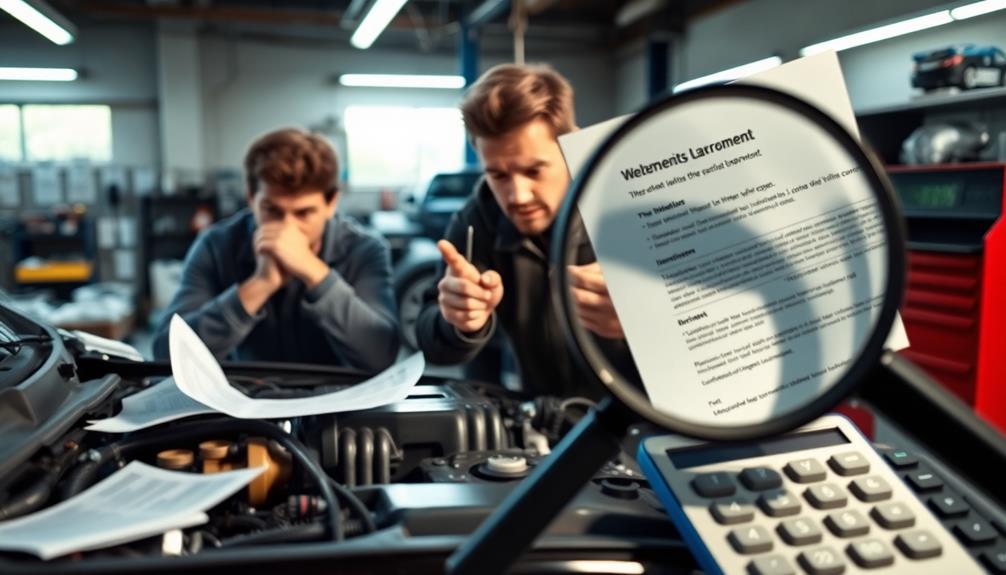
Out-of-pocket expenses can quickly pile up for customers holding aftermarket warranties, as many policies have specific limits and exclusions that often lead to denied claims. In fact, about 50% of claims get denied, leaving you with unexpected costs.
To better understand what you might face, consider these common out-of-pocket expenses:
- Diagnostic Fees: Many warranties don't cover these fees, which can add significant labor costs before filing a claim.
- Non-Covered Repairs: If parts that aren't covered fail, they could damage covered components, leading to hefty repair bills.
- Coverage Limitations: You might discover that certain repairs aren't included, leaving you responsible for the full expense.
- Overpriced Warranties: Some warranties cost more than the actual repairs needed, making a cost-benefit analysis essential.
Awareness of these potential expenses helps you gauge the true value of your warranty.
Understanding the coverage limitations and being prepared for unexpected costs can save you from financial strain and frustration later on.
Don't let hidden out-of-pocket expenses catch you off-guard—stay informed and plan ahead.
Importance of Customer Education

Understanding the ins and outs of aftermarket warranties can make a significant difference in your experience as a vehicle owner. Customer education is essential because around 50% of warranty claims are denied due to misunderstandings about coverage. When you know the specific terms and limitations of your warranty, you can avoid unexpected costs and potential out-of-pocket expenses.
Moreover, it's important to grasp the lengthy claim process, which can take up to 30 days for approval. By setting realistic expectations for repair timelines, you'll reduce frustration during what can already be a stressful situation.
Transparency is key; understanding common disputes over labor rates and parts pricing can help you navigate negotiations that warranty companies often engage in, ultimately impacting your final payout.
Lastly, being aware of the financial implications of warranties empowers you to make informed decisions. Sometimes, the costs of the warranty can exceed actual repair expenses, and knowing this can help you choose the best maintenance options for your vehicle.
Mechanics' Perspectives on Warranties
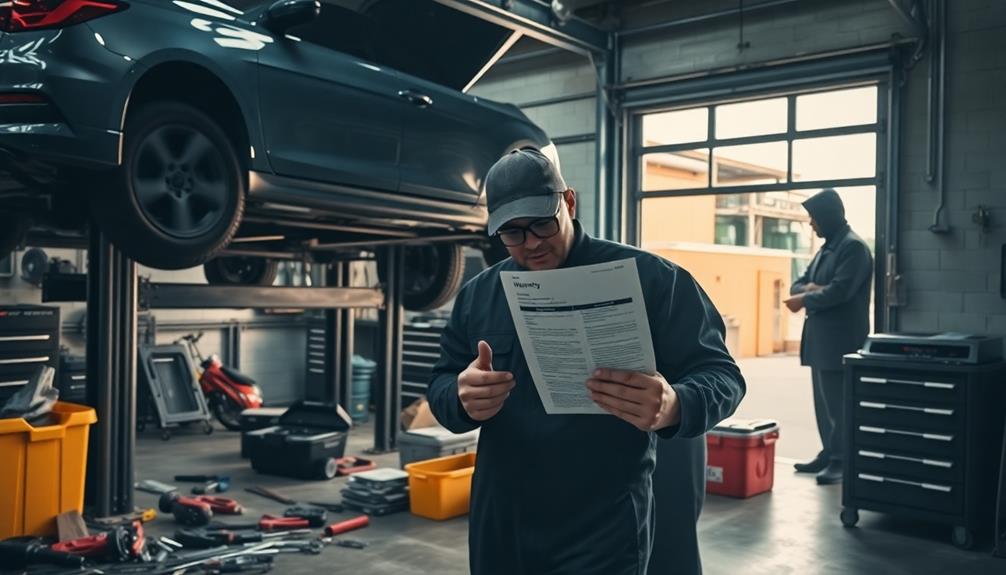
Mechanics often find themselves at odds with the complexities of aftermarket warranties, which can complicate their work and affect their relationships with customers. Here are some key frustrations they face: For instance, these warranties might not cover certain parts or labor, leaving customers frustrated and placing the blame on the mechanics for high out-of-pocket expenses. This can lead to misunderstandings, with customers often believing they are being overcharged, when in reality, the *real reason for high repair costs* stems from exclusions or limitations within the warranty itself. Ultimately, the mechanic is left navigating a delicate balance between trying to help the customer and working within the constraints of the warranty terms.
- High Claims Denial Rate: About 50% of claims get denied, leaving customers with unexpected costs.
- Lengthy Approval Processes: Warranty claims can take up to 30 days for approval, delaying the repair process.
- Adversarial Communication: Negotiating over labor rates and parts pricing with warranty companies can be contentious.
- Extensive Documentation: The intricate paperwork required can hinder timely repairs.
These challenges can create tension between mechanics and clients, especially when customers expect full coverage.
Mechanics understand that customer education is essential; many clients don't realize the limitations of their warranties. When claims are denied or payouts are lower than anticipated, dissatisfaction can arise.
This not only impacts customer trust but also puts mechanics in a tough spot as they navigate the complexities of warranties while trying to provide quality service.
If mechanics don't address these issues, they may reconsider accepting these warranties, further complicating the repair process and customer relationships.
Making Informed Warranty Decisions
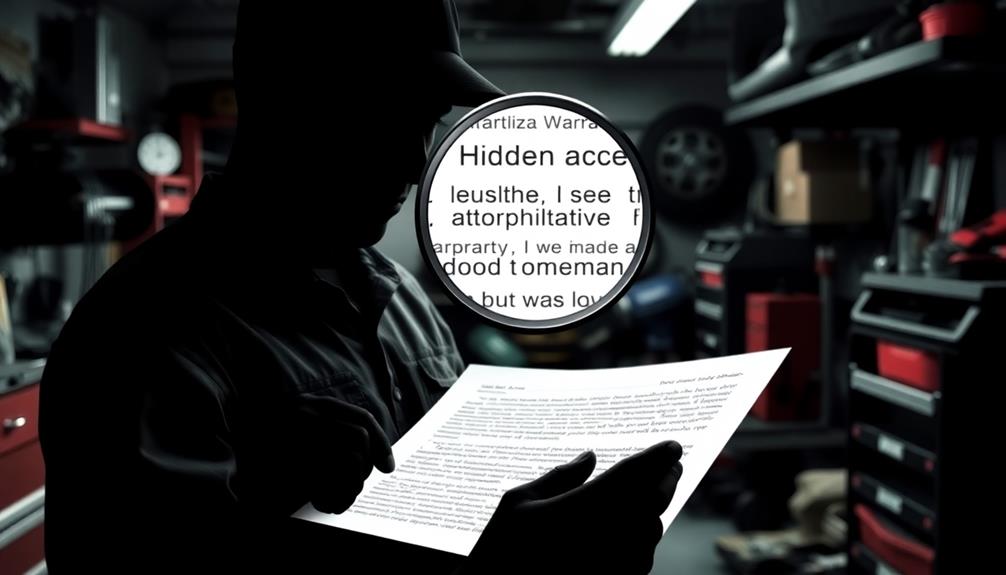
When it comes to purchasing aftermarket warranties, you'll want to weigh the pros and cons carefully. Many warranties come with complex terms that can hide exclusions, leading to denied claims around 50% of the time. Before committing, conduct a thorough cost vs. benefit analysis. You might find that the total cost of the warranty exceeds the actual repair expenses you'd face without it.
Be aware of the limitations these warranties may impose. Claims often require extensive documentation, and an initial diagnosis can delay repairs, leading to out-of-pocket expenses that the warranty won't cover.
Additionally, communicating with warranty companies can be frustrating, with long wait times and negotiations over labor rates, further impacting repair timelines.
Educating yourself on these factors fosters transparency and helps manage your expectations. By understanding the potential pitfalls associated with aftermarket warranties, you'll be better equipped to decide if they're worth it for your situation.
Ultimately, making informed warranty decisions can save you from unnecessary costs and dissatisfaction down the line. Always think critically about whether a warranty aligns with your needs and budget before signing on the dotted line.
Frequently Asked Questions
What Are 5 Common Acts That Void Your Vehicle's Warranty?
Modifying your vehicle with aftermarket parts, skipping regular maintenance, using non-approved fluids, neglecting to keep repair records, or going to unauthorized repair shops can all void your warranty. Stay vigilant to protect your investment.
What to Do if Company Refuses Warranty?
When a warranty company shuts the door on your claim, don't let it slam in your face. Review the terms, document your interactions, and consider appealing or seeking legal help to fight back effectively.
What Is Hidden Warranty?
A hidden warranty's an unofficial coverage that manufacturers offer for specific defects, often without public knowledge. You should research your vehicle's make and model to discover potential hidden warranties that could save you money on repairs.
Does Going to a Mechanic Void Warranty?
No, going to a mechanic doesn't automatically void your warranty. As long as repairs are necessary and don't alter your vehicle's original condition, you're protected. Just keep detailed records of all maintenance and repairs.
Conclusion
So, as you plunge into the world of warranties, you might think you're covered from every angle. Ironically, those hidden exclusions could leave you high and dry when you need help the most. Mechanics might not shout about these loopholes, but knowing them can save you a headache—and a hefty bill. By arming yourself with the right info, you're not just a customer; you're a savvy decision-maker, ready to outsmart the system.
